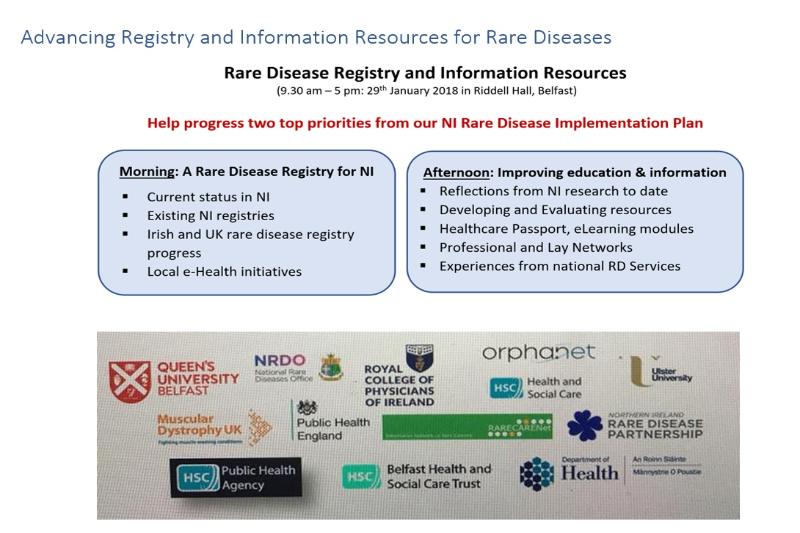Moving towards NIRADCAR? A Northern Ireland RAre Diseases & Congenital Abnormalities Registry
Rare disease research consistently highlights a need for a local rare disease registry. Our 2020 report, 'Perspectives on a NI Rare Disease Registry' provides an update on the background, evidence, and potential for a local registry.

Perspectives on a NI Rare Disease Registry
McMullan J1, Crowe A1, Kerr K1, Baillie C1, McAneney H1,2, McLaughlin F2, Collins C2, McKnight, AJ1,2
1. Centre for Public Health, Queen’s University of Belfast; 2. Northern Ireland Rare Disease Partnership; DOI 10.17605/OSF.IO/XU7P8
A rare disease is defined as any life-limiting or chronically debilitating disease affecting fewer than one person in 2,000, with many rare diseases affecting less than one person per 100,000. There are approximately 8,000 rare diseases with recent analysis suggesting a conservative prevalence of 3.5-5.9%. Over the last decade, tremendous advances have been made in rare disease identification, treatment and support. This has been largely driven by an increasingly vehement consolidated patient voice and an EU directive (2009) that all member states required a rare disease plan/strategy by 2013. In 2013, the UK strategy for rare disease was published followed by the launch of devolved nation rare disease implementation plans (Scotland in 2014; Northern Ireland in 2015; Wales in 2017). The Republic of Ireland published their national plan for rare diseases in 2014.
Rare Disease registries are essential components of improving healthcare for the rare disease community. Historical challenges of developing such registries are minimised with technological advances, interoperable systems, and collaboratively shared expertise. This report was generated to help inform the NI rare disease stakeholder implementation group, including developments from ROI, England, Scotland and Wales. The need for a coordinated and cohesive approach to information on rare diseases was identified as a priority in the consultation process leading to the development of Northern Ireland’s Implementation Plan; and this is reflected in the Priority Action “To complete a database review and produce a costed action plan to implement a Northern Ireland register of Rare Disease”. The request for a sustainable, NI rare disease registry has been consistently reported in the top three priorities from healthcare professional, industry, public and patient stakeholder / open meetings. Work has been completed to identify existing data sources (31 rare disease clinical / research ‘lists’, several of which are in danger of being permanently lost), and scoping how a Rare Disease Registry for Northern Ireland can be progressed in line with NI’s unique legislation and health and social care information systems. A rare disease registry for Northern Ireland with clinical and administrative data linkages were requested by multiple groups, but many have insufficient resources (funding, people, skills, or computational) to create this themselves. Many names were suggested for such a NI registry, with the majority voting for, ‘NIRADCAR: Northern Ireland RAre Diseases & Congenital Abnormalities Registry’. From the >8,000 rare diseases described in the literature, ~80% have a molecular cause. While the majority of rare diseases (84.5%) are very rare with a prevalence less than one million individuals, a recent review of Orphanet revealed that more than 98% of people diagnosed with a rare disease have one of the 390 less unusual rare diseases, with ~80% of the population burden of rare disease believed attributable to ~150 rare diseases. Almost 70% of rare diseases have an exclusively paediatric onset with one-third of rare disease patients dying before their fifth birthday. Approximately 15% of individuals with a rare disease have a congenital abnormality; the majority of congenital anomaly phenotypes reported in UK registers are considered rare diseases. Collecting data on rare diseases and congenital anomalies is challenging due to the often diverse, fragmented sources of original information. This paper describes initial consultations supporting the design of a rare disease registry that collects data along a longitudinal care pathway in near-real time, with an emphasis placed on the ability to link data from a wide range of sources.

Several years research, including a series of well attended events, revealed thirteen key themes described in relation to developing a NI rare disease registry.
Acknowledgements: We thank all the individuals, patients, families, community groups, health, social, and educational professionals, colleagues, facilities managers, representatives from rare disease industries, and participants who generously gave their time and shared expertise to develop this document. Explicit acknowledgements are also provided within individual workshop reports. Thank You - your input is much appreciated.

Media
For more information, please do get in touch via email

